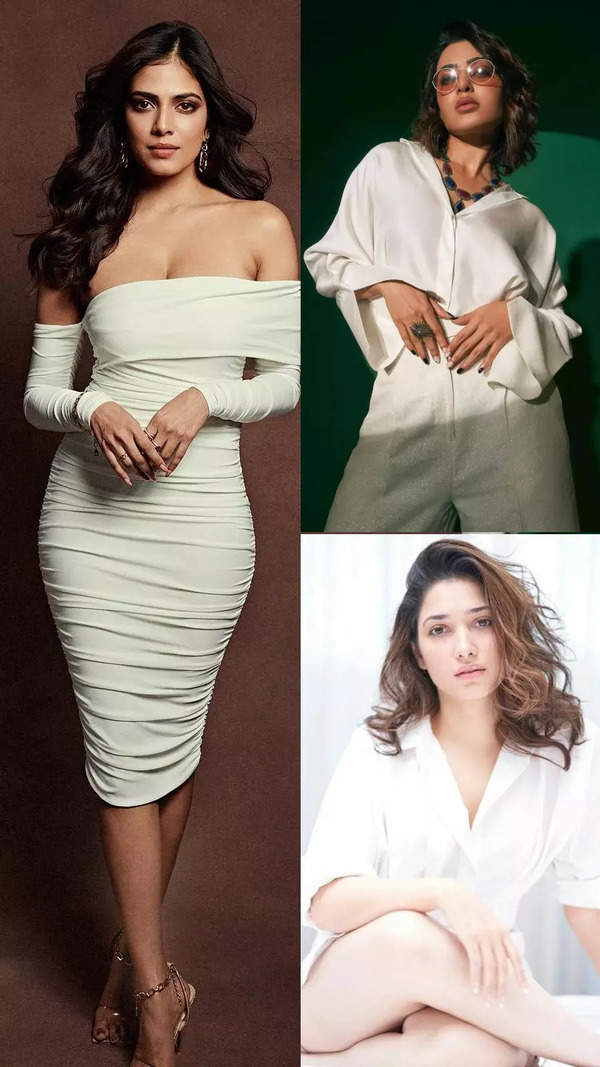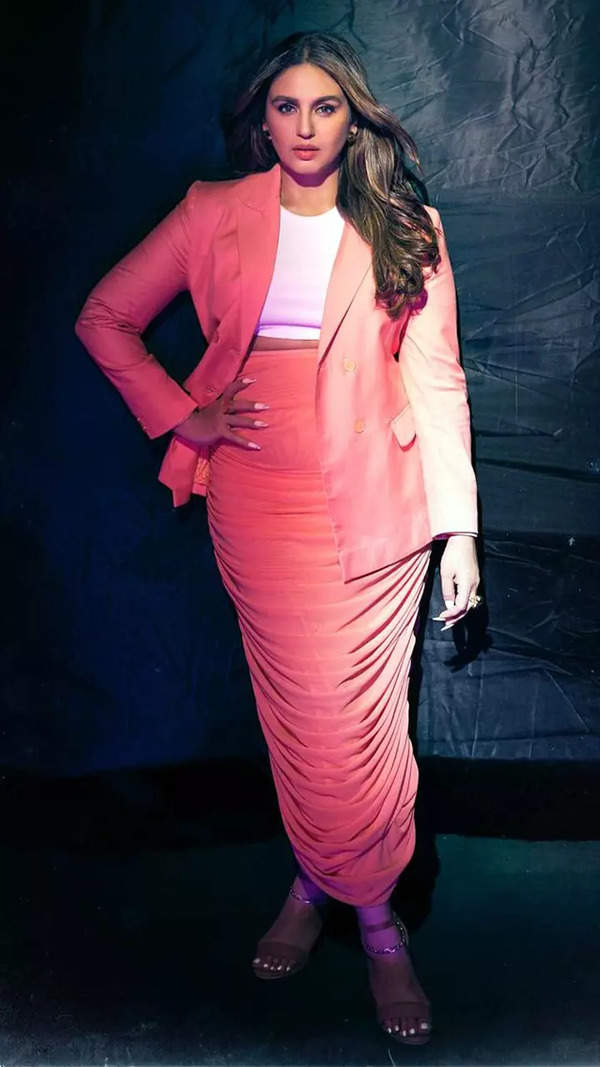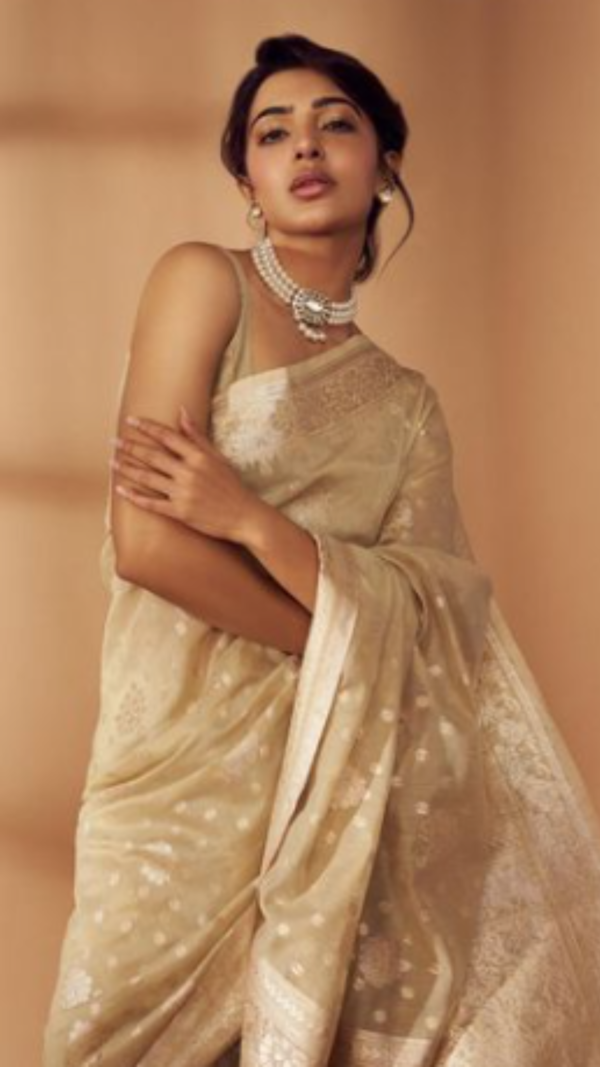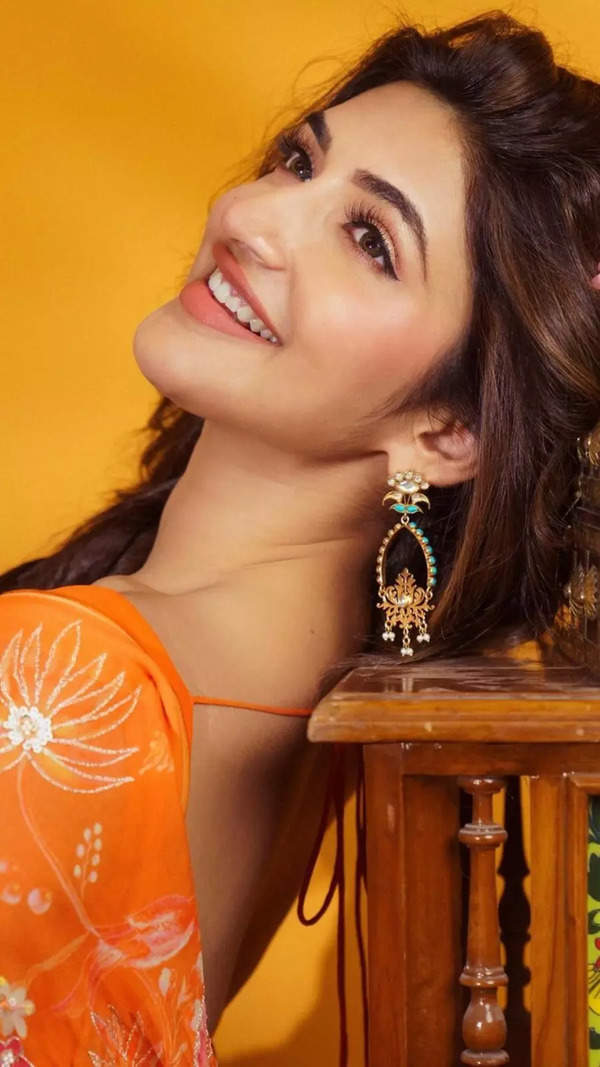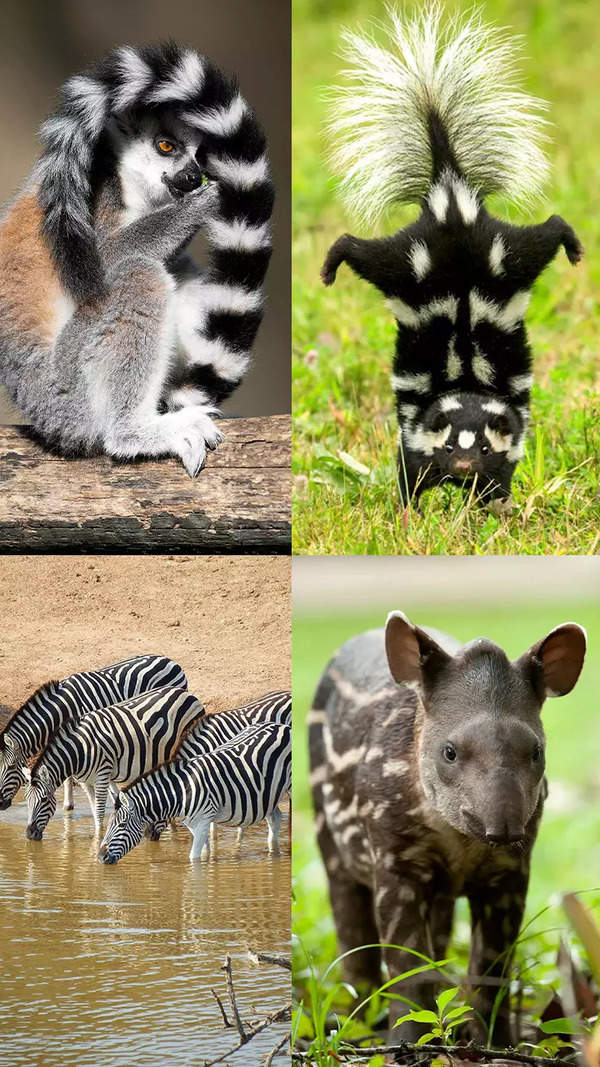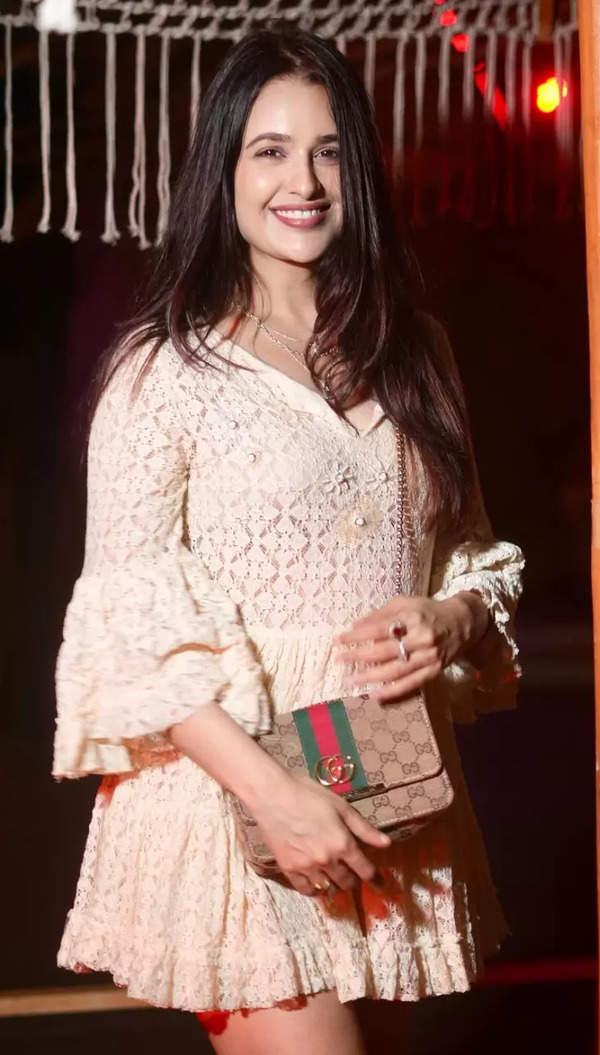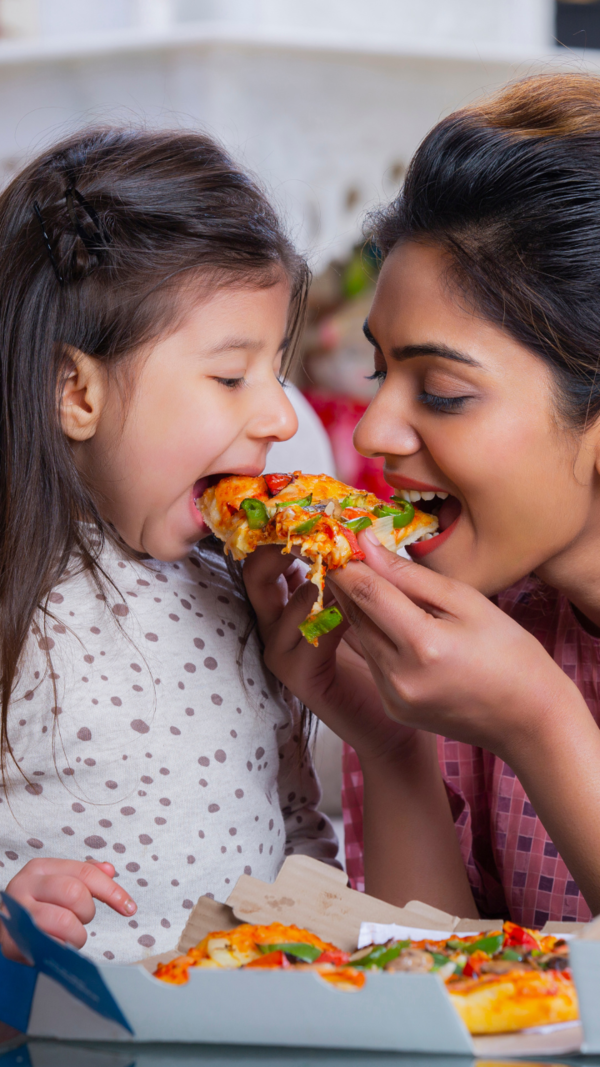- News
- web-series
- Neeraj Ghaywan's work is important, but this is my life: Dalit author Yashica Dutt on the OTT show that depicts her, without acknowledging it
Trending
This story is from August 18, 2023
Neeraj Ghaywan's work is important, but this is my life: Dalit author Yashica Dutt on the OTT show that depicts her, without acknowledging it
Activist and author Yashica Dutt has expressed her disappointment at how "Made in Heaven" showrunner Neeraj Ghaywan and the production house used her words to create a powerful narrative but did not acknowledge her or seek her permission before doing so. Although Ghaywan responded to the author on social media, he has not given her the credits she requested, nor commented on the controversy. Dutt has called for show creators Zoya Akhtar and Reema Kagti also to acknowledge her "life's work and ideas.

Yashica Dutt (L) and Radhika Apte from a still from the episode of Made in Heaven
Ever since the second season of Made in Heaven arrived with band, baaja and designer lehngas, audiences have been busy picking their favourite moments, weddings and dialogues from the show. The most talked-about episode at the moment features the compelling story of a Dalit writer and activist, who is feted globally for embracing her caste identity and 'coming out', but faces predictable prejudices back home when she wishes to marry in a Buddhist inter-caste ceremony.
While showrunner Neeraj Ghaywan has received a fair bit of appreciation for his presentation of the feisty Pallavi Menke (played by Radhika Apte), he has also come under heavy criticism from Dalit writer, activist Yashica Dutt, whose life and work has been at the heart of the story. In a post that went viral earlier this week, Yashica expresses her dismay at how Neeraj and the production house used her words and her book 'Coming out as a Dalit', her experiences (studied in Columbia and embraced her Dalit identity, grandmother was engaged with manual cleaning) to create a powerful narrative, and yet did not acknowledge her or seek her permission before doing so.

Though Neeraj later doffed a hat to Yashica in a social media post, he has not responded to the author's call for credits and declined to comment on the controversy when we reached out to him.

Meanwhile, in a conversation with this publication, Yashica spoke at length about why she feels it is important to call out the Hindi tv/film tradition of "taking anything from anywhere to create its narratives" without due credits and why she wants show creators Zoya Akhtar and Reema Kagti also to acknowledge her "life's work and ideas that contributed to this show."
Excerpts...

That is for the makers of Made in Heaven to answer. All I can say is, the difference between the two characters is that Bharti Mandal was a composite of a queer and Dalit character. Perhaps many. Pallavi is identifiably a single person - me. Ever since that episode went on air, I have been receiving hundreds of messages and calls from those who know me, or have followed my work and read my book, saying that Pallavi Menke walks like me, talks like me. But I am never acknowledged.
I support Neeraj's work - it is important. The Dalit discourse is important and the Dalit women characters he portrays, is important. But it is a separate issue. Here, everybody can see, Pallavi is a living person.

Since I live in the public eye, and have some works published to my name, people assume I have access to wealth and power. But I am a journalist and writer who has had to walk the talk. I have lived the shame and talked about it in the public space - from a family involved in manual cleaning to talking about it, owning my identity on an international platform - that's my leap.
No. Neeraj had posted on his IG before I posted about it. So, no formal communication from the production house or the streaming platform so far.
In the past four years since the book was published in India, it has had a huge impact. I was approached by a few fairly big production houses to adapt the book into a show. Especially after I was conferred the Sahitya Akademi Yuva Puraskar. But I was still not ready to relive the trauma of having lived through my experiences and telling my story. It is still very fresh and I am not ready for it. Besides, the book is yet to be published in the US and other regions and I did not wish to undermine the chances of readers discovering my work by putting it out there right now. But regardless of what happens to the book, it is important to understand that while there are many who see me in Pallavi Menke, there are millions watching the show, who will not know that this is me, my life's work, because the show runners have not acknowledged me. I still have the TV and digital licensing rights, and I am still trying to figure out what to do next.
Absolutely. I am not cancelling or calling out, but calling in with respect and empathy. The book is still fresh, alive, breathing. What they have done is created a likeness of a person who is very much present. I may not have got married in the Buddhist tradition as depicted in the episode or married to an Indian, but everything else about Pallavi is me. This episode is an homage without any acknowledgement. And that is not acceptable.
Yes, if you look at Dukhi (Sadgati, Satyajit Ray) or Kachra (Lagaan, Ashutosh Gowariker), these are characters without a voice, or agency. They suffer in silence and accept their destiny, surrender to the system. And while Tamil cinema has had a longer history with unapologetically Dalit characters, Bollywood is now at a powerful moment as far as Dalit representation is concerned. When was the last time you had a Dalit character say "Personal is political," on screen? That merits a celebration, even as we must continue to have these conversations.
While Neeraj later doffed a hat to Yashica in a social media post, he did not respond to the author’s call for credits. Till the time of going to press, neither Amazon nor the show creators were available for comment. However, on Thursday evening, Zoya Akhtar put out a social media post refuting Yashica's claims. The same was shared by Neeraj, and both attracted a flurry of reactions from netizens.


While showrunner Neeraj Ghaywan has received a fair bit of appreciation for his presentation of the feisty Pallavi Menke (played by Radhika Apte), he has also come under heavy criticism from Dalit writer, activist Yashica Dutt, whose life and work has been at the heart of the story. In a post that went viral earlier this week, Yashica expresses her dismay at how Neeraj and the production house used her words and her book 'Coming out as a Dalit', her experiences (studied in Columbia and embraced her Dalit identity, grandmother was engaged with manual cleaning) to create a powerful narrative, and yet did not acknowledge her or seek her permission before doing so.
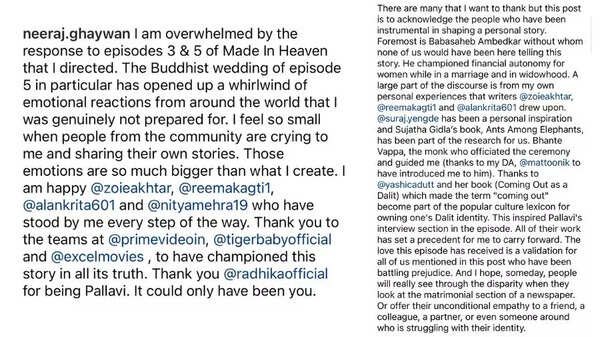
Neeraj Ghaywan's social media post
Though Neeraj later doffed a hat to Yashica in a social media post, he has not responded to the author's call for credits and declined to comment on the controversy when we reached out to him.

Snippet of Yushica's social media post
Meanwhile, in a conversation with this publication, Yashica spoke at length about why she feels it is important to call out the Hindi tv/film tradition of "taking anything from anywhere to create its narratives" without due credits and why she wants show creators Zoya Akhtar and Reema Kagti also to acknowledge her "life's work and ideas that contributed to this show."
Excerpts...
In 2021, you praised Neeraj Ghaywan for his depiction of a Dalit woman in
Geeli Pucchi
as part of the Ajeeb Daastans anthology. You wrote how watching Konkona Sen's character Bharti Mandal acknowledge that she is a Dalit, was a "cathartic" experience for you. Now we have the same filmmaker, whose depiction of another Dalit woman, Pallavi Menke, has caused you "heartbreak" since it strips you of your identity and your voice by not acknowledging you as the inspiration behind the protagonist. What changed between the two shows you think, and why?
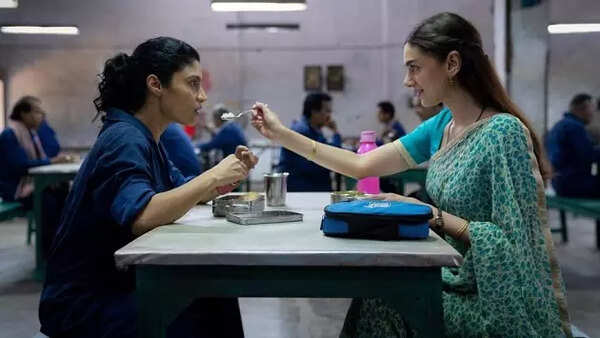
A still from 'Geeli Pucchi'
That is for the makers of Made in Heaven to answer. All I can say is, the difference between the two characters is that Bharti Mandal was a composite of a queer and Dalit character. Perhaps many. Pallavi is identifiably a single person - me. Ever since that episode went on air, I have been receiving hundreds of messages and calls from those who know me, or have followed my work and read my book, saying that Pallavi Menke walks like me, talks like me. But I am never acknowledged.
I support Neeraj's work - it is important. The Dalit discourse is important and the Dalit women characters he portrays, is important. But it is a separate issue. Here, everybody can see, Pallavi is a living person.
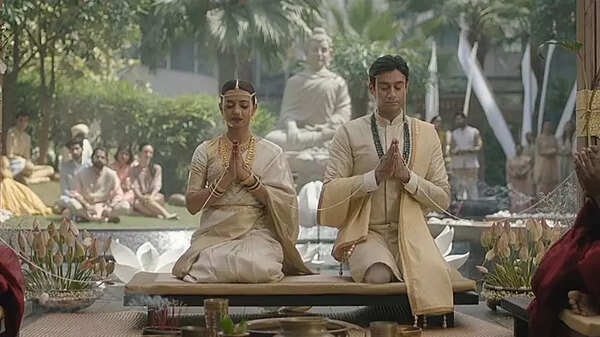
A still from Made in Heaven Season 2
Since I live in the public eye, and have some works published to my name, people assume I have access to wealth and power. But I am a journalist and writer who has had to walk the talk. I have lived the shame and talked about it in the public space - from a family involved in manual cleaning to talking about it, owning my identity on an international platform - that's my leap.
Did the makers of the show reach out to you before or after the show, or respond to your social media post seeking acknowledgement?
No. Neeraj had posted on his IG before I posted about it. So, no formal communication from the production house or the streaming platform so far.
Were you ever approached by any other production house for TV or film rights of your book?
In the past four years since the book was published in India, it has had a huge impact. I was approached by a few fairly big production houses to adapt the book into a show. Especially after I was conferred the Sahitya Akademi Yuva Puraskar. But I was still not ready to relive the trauma of having lived through my experiences and telling my story. It is still very fresh and I am not ready for it. Besides, the book is yet to be published in the US and other regions and I did not wish to undermine the chances of readers discovering my work by putting it out there right now. But regardless of what happens to the book, it is important to understand that while there are many who see me in Pallavi Menke, there are millions watching the show, who will not know that this is me, my life's work, because the show runners have not acknowledged me. I still have the TV and digital licensing rights, and I am still trying to figure out what to do next.
But you also write in your post that the work Neeraj has been doing is important.
Absolutely. I am not cancelling or calling out, but calling in with respect and empathy. The book is still fresh, alive, breathing. What they have done is created a likeness of a person who is very much present. I may not have got married in the Buddhist tradition as depicted in the episode or married to an Indian, but everything else about Pallavi is me. This episode is an homage without any acknowledgement. And that is not acceptable.
You have written in your book, and also in your social media posts, about how much the cinematic representation of Dalit characters has changed over the years.
Yes, if you look at Dukhi (Sadgati, Satyajit Ray) or Kachra (Lagaan, Ashutosh Gowariker), these are characters without a voice, or agency. They suffer in silence and accept their destiny, surrender to the system. And while Tamil cinema has had a longer history with unapologetically Dalit characters, Bollywood is now at a powerful moment as far as Dalit representation is concerned. When was the last time you had a Dalit character say "Personal is political," on screen? That merits a celebration, even as we must continue to have these conversations.
While Neeraj later doffed a hat to Yashica in a social media post, he did not respond to the author’s call for credits. Till the time of going to press, neither Amazon nor the show creators were available for comment. However, on Thursday evening, Zoya Akhtar put out a social media post refuting Yashica's claims. The same was shared by Neeraj, and both attracted a flurry of reactions from netizens.

Screenshots of the social media post put out by the creators of the show (1)
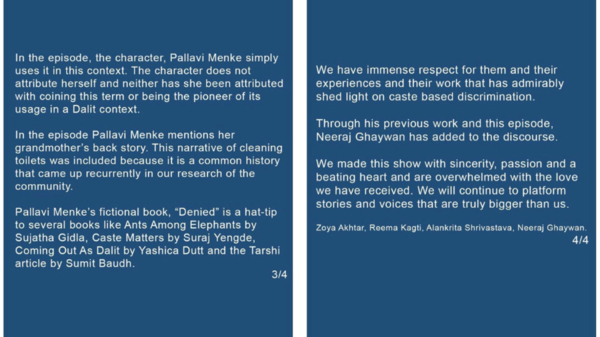
Screenshots of the social media post put out by the creators of the show (2)
End of Article
FOLLOW US ON SOCIAL MEDIA

